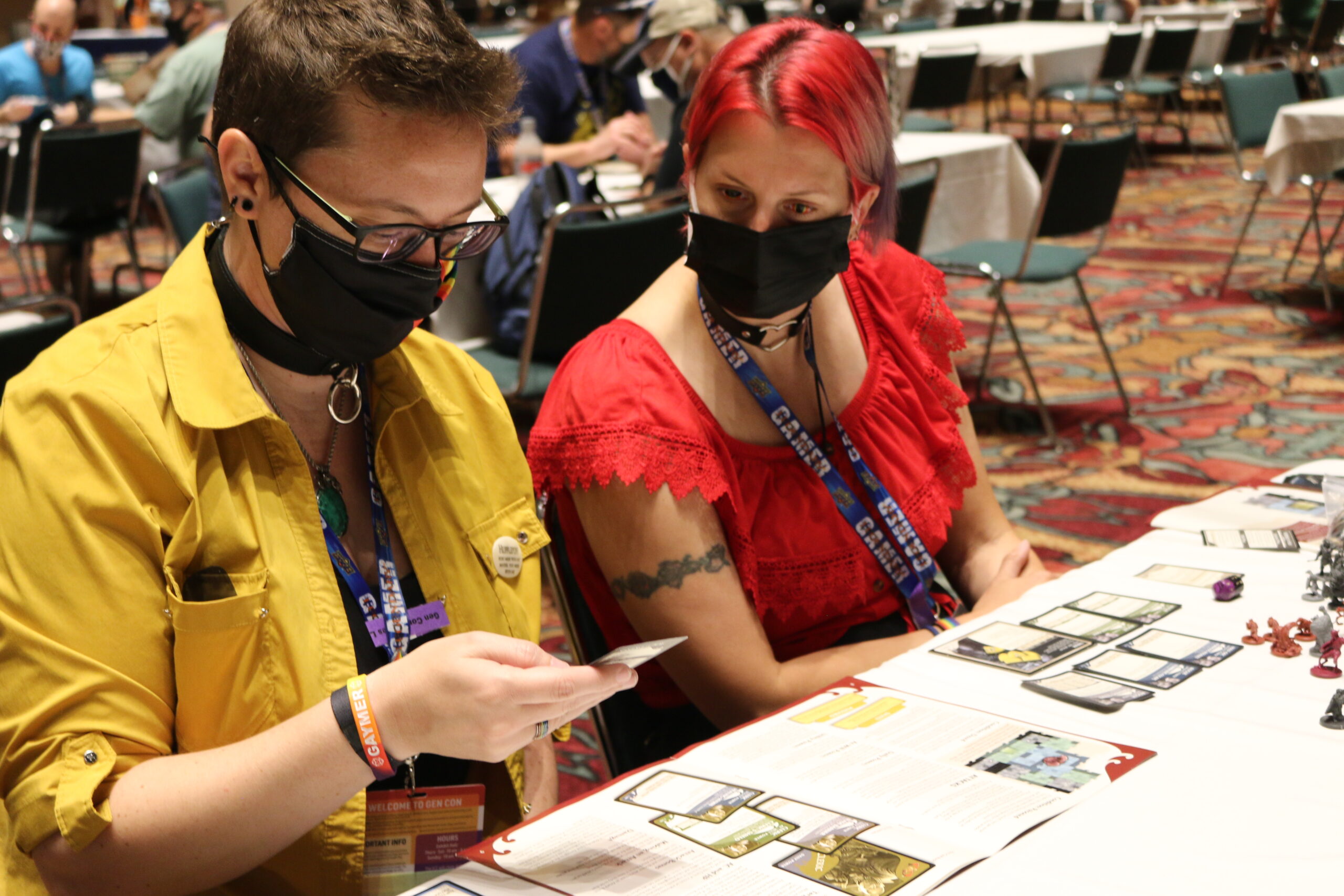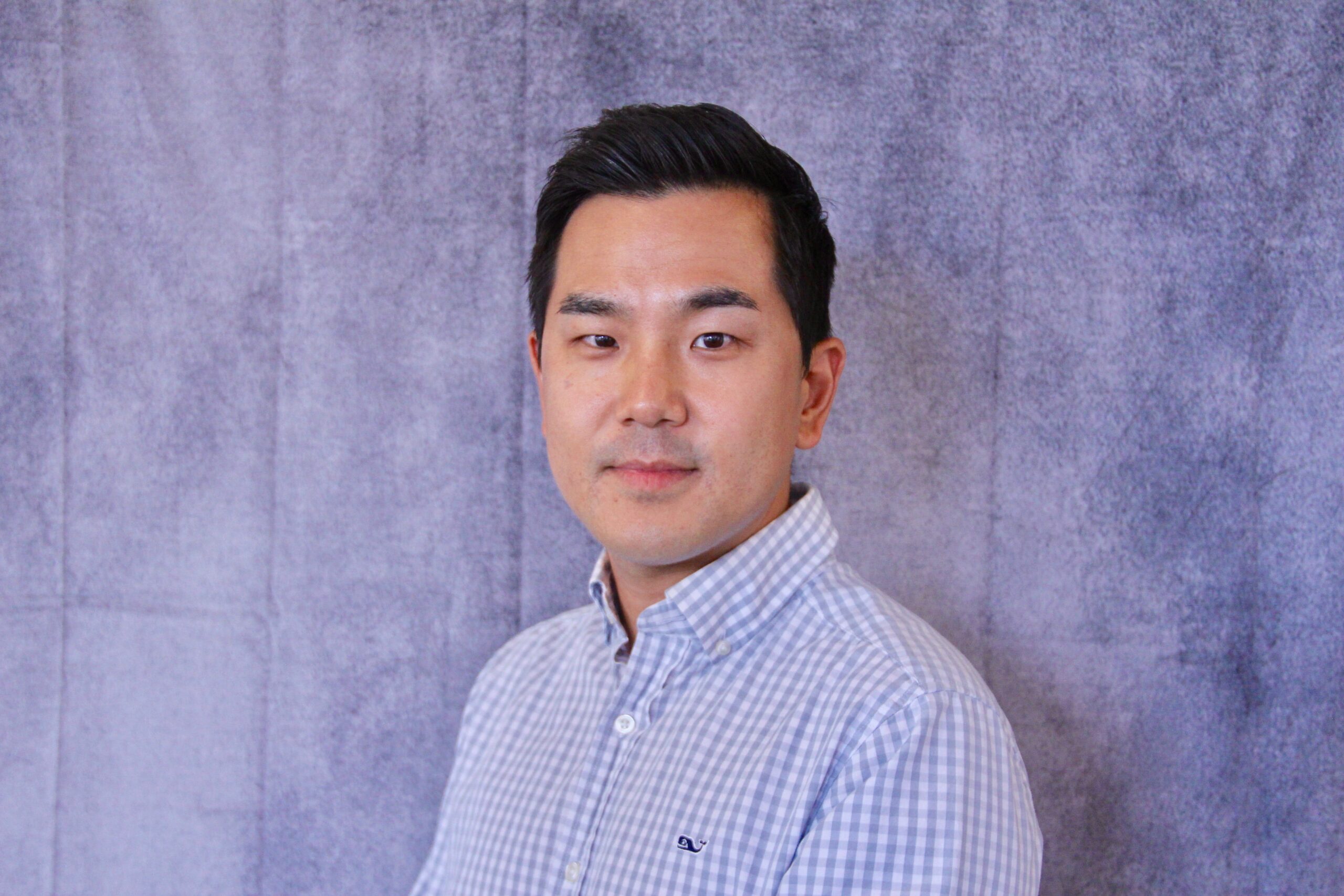Purdue researcher: Technology helping convention industry rebound from COVID-19

Two of 2021 Gen Con’s 35,000 attendees play a card game. Purdue researcher Shawn Jung said Indianapolis’ investment in its facilities and airport keeps large conventions — and economic benefits — coming to Indiana.Photo courtesy of Gen Con
Written by: Tim Brouk, tbrouk@purdue.edu

Assistant Professor Shawn JungTim Brouk
Thousands of elves, wizards and warriors will invade Indiana when Gen Con returns to downtown Indianapolis on Aug. 4-7.
The national role-playing game convention has been a Circle City summer staple for almost 20 years and has grown to levels that cast a level-five charm spell on Shawn Jung, assistant professor in the Purdue University White Lodging-J.W. Marriott, Jr. School of Hospitality and Tourism Management. Jung worked in the international convention industry for most of his professional life. He jumped to academia while in Las Vegas, Nevada, before arriving to the College of Health and Human Sciences in 2020.
Despite the lingering effects of the COVID-19 pandemic, the 2021 Gen Con event went well. Jung was impressed at the convention’s safety policies, technology use and attendance.
“It’s almost like a small city built up in the space,” said Jung, noting last year’s Gen Con drew 35,000 attendees.
Jung studies the ins and outs of conventions and similar events — technology that enhances attendees’ experiences, technology that assists organizers, how events impact cities’ economies and how conventions are navigating loosened COVID-19 restrictions.
Impressed by Indiana
When connections from his home city of Seoul, South Korea, brought him to the United States, Jung found his passion for conventions in Las Vegas, a place that knows its gatherings well.
“I got familiar with how the convention works, and I was fascinated at how big the industry is just from working at the Las Vegas Convention Center and a lot of convention hotels on the Las Vegas Strip,” Jung recalled. “When I saw the Consumer Electronics Show, I was like, ‘Wow, this is where I want to really be in the future.’”
Sin City is also where he started his teaching career at the University of Nevada, Las Vegas after receiving his advanced degrees from the same school. Jung’s career then took him to Denver, Colorado, where he earned an assistant professorship at Metropolitan State University of Denver.
Upon his move to the Hoosier State, Jung was greeted by the 2021 NCAA men’s basketball tournament. Opening rounds were held across Indiana, including Purdue’s Mackey Arena. While the action on the court was impressive, Jung was most impressed with how the tournament and its fan experience went on despite the shadow of COVID-19.
“Just looking at that, Indianapolis has invested a lot of resources in its facilities and airport, which has won awards for a few years in a row as the best midsize airport. Those improvements in a city’s infrastructure and the investment really helps the convention industry,” said Jung, while mentioning that the NCAA is headquartered out of Indianapolis. “The organizers are aware of it. It’s a big industry, but at the same time, it’s a small field because all of the event planners communicate with each other. Many of them are part of professional associations such as PCMA (Professional Convention Management Association), MPI (Meeting Professionals International), and IAEE (International Association of Exhibitions and Events). If a good example is set, the word really spreads out.”
On a smaller scale, Jung was also impressed with Purdue events reopening in the past academic year. From safety protocols to space utilization, events like his program’s Black Tie Dinner were well run, despite the chaos of the past two years.
“It was very amazing,” Jung said. “There were so many uncertainties that students were worried about. The hospitality industry as a whole was hit by the pandemic so hard. But things are getting better, and we’ve opened up a lot of events.”
Tech and hybrid experiences
It’s undeniable that COVID-19 forever transformed the event-planning industry, but some of the changes made out of necessity have enhanced the experience from both the planner’s and attendee’s perspectives.
Jung said during the pandemic, start-up companies and software developers created digital platforms that act as a one-stop place to plan, organize and analyze an event. Platforms like Cvent and Aventri maximize the experience for attendees because the new technology helps planners organize their ideas. No detail is scattered or lost.
“Some of these companies started with a virtual platform, but now, there’s a total event management experience platform,” Jung explained. “It can not only livestream and record the event but also does the data analysis, registration, floor planning — those features planners need to put on a virtual or hybrid event.”
Most conventions the size of Gen Con offer hybrid experiences for attendees via apps created just for the event, Jung said. He and his colleagues dub this technological initiative as a “hybrid” take on an event. From gaining admission to asking guest speakers questions via a mobile device instead of a microphone in front of hundreds of other attendees, the digital realm is everywhere for such events.
The new tech is intuitive, and it’s already having a positive effect on the event industry.
“Technology really helps attendee experiences,” Jung said. “At the end of the day, the two main reasons people attend these events are to get educated and to network with the right people.
It’s not just a combination of digital and in-person. There are tons of ways event planners can work around in terms of being hybrid. Digital platforms and technology have to be the accelerator of the in-person event, not a replacement. It’s an enhancer, not a replacer.”
While business and trade conventions are still hurting due to the lingering effects of COVID-19, Jung said entertainment conventions like Gen Con and the return of the San Diego Comic-Con have rebounded quickly — and with a vengeance. The San Diego Comic-Con generated about $3.2 million for the city during its July 21-24 run.
Current research
Somewhat adjacent to comic book and role-playing game conventions, the dramatic rise of esports has captivated Jung’s research interests. Competition is fierce, and fandom extends beyond Twitch, a popular site for gamers to watch other gamers play and interact.
A $1 billion U.S. industry in 2021, esports events usually involve teams competing in games such as League of Legends, Rocket League or Fortnite. Championship tournaments draw enthusiastic crowds. The largest in history came in 2019 when an astounding 174,000 attended an Electronic Sports League (ESL) and Intel Extreme Masters championship in Poland. Jung is currently researching why people would leave their homes to watch other people play video games. He believes event organizers have something to do with the success.
“The arena is filled with thousands of people just looking at this big screen. Down there on the stage, people are playing the games. It really attracts people. What I’m trying to get through research is why people are gathering face-to-face. It could be held just online,” said Jung, who organized, along with the Purdue Esports Committee, Purdue’s first Games Make a Difference: Academic Gaming and Esport Symposium in April. “It’s not just about playing games, watching the games or learning the games’ strategies. It’s about networking.”
Still practicing what he teaches and researches, Jung has been involved with Purdue event planning. He regularly brings various event professionals to his classes for guest lectures, and he’s even rolling his sleeves up in helping organize the Purdue Hospitality Summit, slated for Sept. 29 and 30.
Whether its luring in thousands of orcs and warlocks to Indiana or hospitality industry leaders to West Lafayette, event-planning is hard work, but the shared passion for the work is stronger than ever.
“I always tell my students to keep their minds open rather than just focusing on the area that you’re familiar with because there are so many opportunities and rewarding moments that you will face,” Jung said.